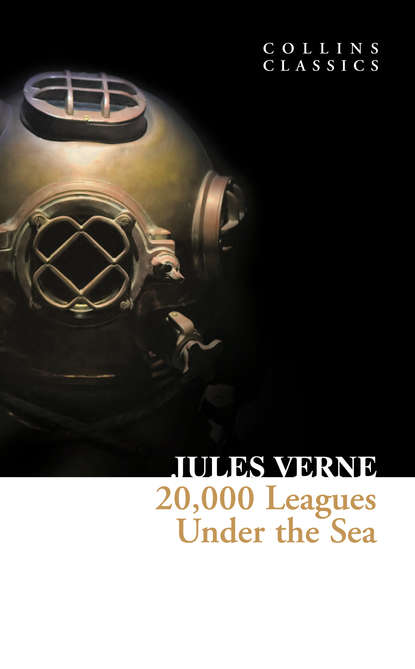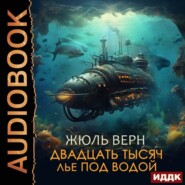По всем вопросам обращайтесь на: info@litportal.ru
(©) 2003-2024.
✖
20,000 Leagues Under The Sea
Настройки чтения
Размер шрифта
Высота строк
Поля
‘It must have cost you a great deal.’
‘An iron vessel costs £45 a ton. The Nautilus weighs 1500 tons. It came, therefore, to £67,500, and £80,000 more for fitting up; altogether, with the works of art and collections it contains, it cost about £200,000.’
‘You must be rich?’
‘Immensely rich, sir; I could, without missing it, pay the English national debt.’
I stared at the singular person who spoke. Was he taking advantage of my credulity?
CHAPTER 14 The Black River (#ulink_6b71f543-dc11-5755-be78-3e3498cfbc30)
The Pacific Ocean extends from north to south between the two polar circles, and from west to east between Asia and America over an extent of 145° of longitude. It is the smoothest of all seas; its currents are wide and slow, its tides slight, its rains abundant. Such was the ocean that my destiny called upon me to go over under such strange conditions.
‘Now, professor,’ said Captain Nemo, ‘we will, if you please, take our bearings and fix the starting-point of this voyage. It wants a quarter to twelve. I am going up to the surface of the water.’
The captain pressed an electric bell three times. The pumps began to drive the water out of the reservoirs; the needle of the manometer marked by the different pressures the ascensional movement of the Nautilus, then it stopped.
‘We have arrived,’ said the captain.
We went to the central staircase which led up to the platform, climbed the iron steps, and found ourselves on the top of the Nautilus.
The platform was only three feet out of the water. The front and back of the Nautilus were of that spindle shape which caused it justly to be compared to a cigar. I noticed that its iron plates slightly overlaid each other, like the scales on the body of our large terrestrial reptiles. I well understood how, in spite of the best glasses, this boat should have been taken for a marine animal.
Towards the middle of the platform, the boat, half sunk in the vessel, formed a slight excrescence. Fore and aft rose two cages of medium height, with inclined sides, and partly enclosed by thick lenticular glasses. In the one was the helmsman who directed the Nautilus; and in the other a powerful electric lantern that lighted up his course.
The sea was beautiful, the sky pure. The long vessel could hardly feel the broad undulations of the ocean. A slight breeze from the east rippled the surface of the water. The horizon was quite clear, making observation easy. There was nothing in sight – not a rock nor an island, no Abraham Lincoln, nothing but a waste of waters.
Captain Nemo took the altitude of the sun with his sextant to get his latitude. He waited some minutes till the planet came on a level with the edge of the horizon. Whilst he was observing, not one of his muscles moved, and the instrument would not have been more motionless in a hand of marble.
‘It is noon. Professor, when you are ready –’
I cast a last look at the sea, slightly yellowed by the Japanese coast, and went down again to the saloon.
There the captain made his point, and calculated his longitude chronometrically, which he controlled by preceding observations of horary angles. Then he said to me, –
‘M. Aronnax, we are in west longitude 137° 15.’
‘By what meridian?’ I asked quickly, hoping that the captain’s answer might indicate his nationality.
‘Sir,’ he answered, ‘I have different chronometers regulated on the meridians of Paris, Greenwich, and Washington. But, in your honour, I will use the Paris one.’
This answer taught me nothing. I bowed, and the commander continued, –
‘Thirty-seven degrees and fifteen minutes longitude west of the Paris meridian, and thirty degrees and seven minutes north latitude – that is to say, about three hundred miles from the coasts of Japan. Today, the 8th of November, at noon, our voyage of exploration under the waters begins.’
‘God preserve us!’ I answered.
‘And now, professor,’ added the captain, ‘I leave you to your studies. I have given ENE. as our route at a depth of fifty yards. Here are maps on which you can follow it. The saloon is at your disposition, and I ask your permission to withdraw.’
Captain Nemo bowed to me. I remained alone, absorbed in my thoughts. All of them referred to the commander of the Nautilus. Should I ever know to what nation belonged the strange man who boasted of belonging to none? This hatred which he had vowed to humanity – this hatred which perhaps sought terrible means of revenge – what had provoked it? I, whom hazard had just cast upon his vessel – I, whose life he held in his hands, he had received me coldly, but with hospitality. Only he had never taken the hand I had held out to him. He had never held out his to me.
For a whole hour I remained buried in these reflections, seeking to pierce the mystery that interested me so greatly. Then my eyes fell upon the vast planisphere on the table, and I placed my finger on the very spot where the given latitude and longitude crossed.
The sea has its large rivers like continents. They are special currents, known by their temperature and colour. The most remarkable is known under the name of the Gulf Stream. Science has found out the direction of five principal currents – one in the North Atlantic, a second in the South Atlantic, a third in the North Pacific, a fourth in the South Pacific, and a fifth in the South Indian Ocean. It is probable that a sixth current formerly existed in the North Indian Ocean, when the Caspian and Aral Seas, united to the great Asiatic lakes, only formed one vast sheet of water.
At the point on the planisphere where my finger lay, one of these currents was rolling – the Black River of the Japanese, which, leaving the Gulf of Bengal, where the perpendicular rays of a tropical sun warm it, crosses the Straits of Malacca, runs along the coast of Asia, turns into the North Pacific as far as the Aleutian Islands, carrying with it the trunks of camphor-trees and other indigenous productions, contrasting by the pure indigo of its warm waters with the waves of the ocean. It was this current that the Nautilus was going to follow. I saw that it lost itself in the immensity of the Pacific, and felt myself carried along by it. Just then Ned Land and Conseil appeared at the door of the saloon.
My companions were petrified at the sight of the marvels spread out before their eyes.
‘Where are we – where are we?’ cried the Canadian. ‘At the Quebec Museum?’
‘If monsieur allows me to say so,’ replied Conseil, ‘it is more like the Hotel du Sommerard.’
‘My friends,’ said I, ‘you are neither in Canada nor France, but on board the Nautilus, and at more than twenty-five fathoms below the sea-level.’
‘We believe what monsieur says,’ replied Conseil, ‘but really this saloon is enough to astonish even a Dutchman like me.’
During this time Ned Land, who was not much interested in conchology, questioned me about my interview with Captain Nemo. Had I discovered who he was, whence he came, whither he was going, to what depths he was dragging us? – in short, a thousand questions, to which I had not time to answer.
I told him all I knew, or rather all I did not know, and I asked him what he had heard or seen on his side.
‘I have seen nothing, heard nothing,’ answered the Canadian. ‘I have not even perceived the ship’s crew. Is it by chance, or can it be electric too?’
‘Electric!’
‘Faith, any one would think so. But you, M. Aronnax,’ said Ned Land, who stuck to his idea, ‘can you tell me how many men there are on board? Are there twenty, fifty, a hundred?’
‘I know no more than you, Land; abandon at present all idea of either taking the Nautilus or escaping from it. This vessel is a masterpiece of modern industry, and I should regret not to have seen it. Many people would accept our position only to move amidst such marvels. The only thing to do is to keep quiet and watch what passes.’
‘Watch!’ exclaimed the harpooner, ‘but there’s nothing to watch; we can’t see anything in this iron prison. We are moving along blindfolded.’
Ned Land had scarcely uttered these words when it became suddenly dark. The light in the ceiling went out, and so rapidly that my eyes ached with the change, in the same way as they do after passage from profound darkness to the most brilliant light.
We remained mute and did not stir, not knowing what surprise, agreeable or disagreeable, awaited us. But a sliding noise was heard. It was like as if panels were being drawn back in the sides of the Nautilus.
‘It is the end of all things!’ said Ned Land.
Suddenly light appeared on either side of the saloon, through two oblong openings. The liquid mass appeared vividly lighted up by the electric effluence.
Two crystal panes separated us from the sea. At first I shuddered at the thought that this feeble partition might break, but strong copper bands bound it, giving an almost infinite power of resistance.
The sea was distinctly visible for a mile round the Nautilus. What a spectacle! What pen could describe it? Who could paint the effect of the light through those transparent sheets of water, and the softness of its successive gradations from the lower to the upper beds of the ocean?
The transparency of the sea is well known, and its limpidity is far greater than that of fresh water. The mineral and organic substances which it holds in suspension increase its transparency. In certain parts of the ocean at the Antilles, under seventy-five fathoms of water, the sandy bottom can be seen with clearness, and the penetrating strength of the sun’s rays only appears to stop at 150 fathoms. But in this fluid medium through which the Nautilus was travelling, the electric light was produced in the very bosom of the waves. It was not luminous water, but liquid light.
If phosphorescent illumination in the submarine depths is admitted, Nature has reserved to the inhabitants of the sea one of her most marvellous spectacles, and I could judge of it by the effect of the thousand rays of this light. On either side I had a window opening on these unexplored depths. The darkness in the saloon made the exterior light seem greater, and we could see the same as if the pure crystal had been the panes of an immense aquarium.
The Nautilus did not seem to be moving. It was because there were no landmarks. Sometimes, however, the lines of water, furrowed by her prow, flowed before our eyes with excessive speed.

















